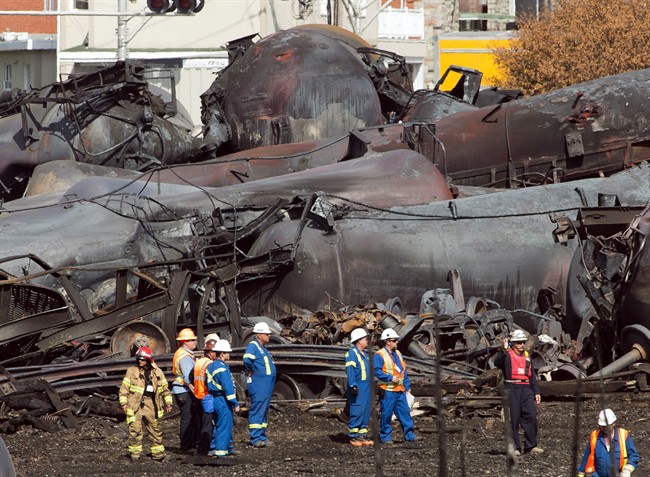LAC-MEGANTIC, Que. — The date for a preliminary hearing for three men charged in the Lac-Megantic train derailment will be set next January, 18 months after 47 people were killed in the devastating tragedy.

The Crown handed over a second batch of evidence on Thursday and will share more in mid-December, said Tom Walsh, the lawyer for one of the accused.
READ MORE: 3 people, rail company face charges in Lac-Megantic railway disaster
Walsh is defending Tom Harding, the engineer on the oil-laden train that exploded in July 2013, erasing much of Lac-Megantic.
Harding, railway traffic controller Richard Labrie and Jean Demaitre, the manager of train operations, each face 47 counts of criminal negligence causing death.
A conviction carries a maximum life sentence.
Harding appeared at the Lac-Megantic courthouse Thursday, even though he didn’t have to. He did not speak to reporters.
Walsh said it was important for his client to attend.
“The spotlight is on him in a sense,” he said in an interview.
“You have to show up in front of the people who have lost what they have lost. You are never going to be comfortable with it but at least you’re there, you’re not afraid to show up, show your face.”
“It’s an important moral obligation.”
Walsh said the names of potential witnesses should be known before mid-January.
Crown spokesman Jean-Pascal Boucher said Thursday no further charges are planned.
The union and lawyers representing Harding and Labrie recently urged the Crown to drop the charges in light of findings by the Transportation Safety Board. Demaitre is not unionized.
They said prosecutors should re-evaluate the case following the release of a TSB report that criticized the train’s operator, Montreal, Maine and Atlantic railway, for its “weak safety culture.”
READ MORE: Lax safety measures, poor training led to fatal Lac-Mégantic rail disaster
Montreal, Maine and Atlantic Canada, a subsidiary of the now-bankrupt MMA, faces the same charges as the three individuals.
The report also targeted Transport Canada for its poor oversight of the industry, particularly amid a boom in oil-by-rail shipments across the continent.
Prosecutors said at the time the TSB report did not change anything about the police evidence that had already been evaluated.
The report identified 18 contributing factors it says led to the crash.
They included the fact Harding applied an insufficient number of hand brakes on the train and conducted an inadequate test before he left the convoy unattended for the night.
Walsh has said Harding’s actions amounted to “human error,” not “wanton and reckless disregard,” which he added was necessary for a criminal-negligence conviction.
He also pointed to the TSB’s findings on Transport Canada and the MMA.
The TSB report concluded the railway did not thoroughly identify security risks and did not have a functioning safety management system – both contributing factors to the crash.
Watch: TSB’s findings on Lac-Megantic derailment
Walsh has suggested a public inquiry be called to examine the disaster, an inquest he said could help dig deep into all the factors behind it.
The three accused were arraigned in Lac-Megantic last May. At the time, Walsh said Harding intended to plead not guilty to the charges.
READ MORE: Public inquiry only way to get to bottom of Lac-Megantic disaster
Walsh also said he asked the court for a jury trial in Lac-Megantic.
Several locals who watched the suspects enter the courtroom in May said they hoped authorities would eventually lay charges against railway and government officials.
Before he left the scene, Harding called MMA’s dispatcher to report mechanical problems on the locomotive and thick smoke belching from its exhaust. They agreed he could leave the engine for the night, so he retired to a hotel.
READ MORE: Transcripts surface from the night of the Lac-Megantic explosion
Later in the night, a fire broke out on the locomotive. Firefighters called to the scene shut down the engine, which allowed its air brakes to slowly disengage.
An MMA track foreman with no background in locomotives met firefighters at the scene.
After consulting the rail-traffic controller, they left without restarting the locomotive. Eventually, the train started rolling toward Lac-Megantic, where it derailed and exploded.





Comments